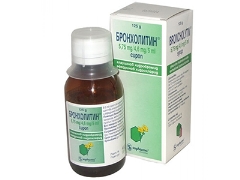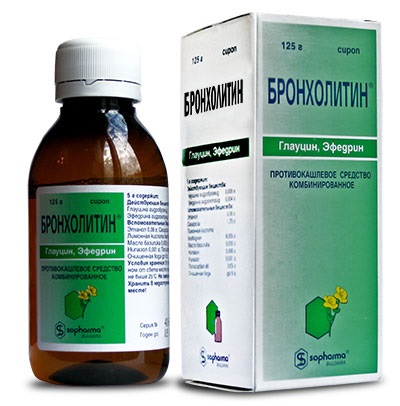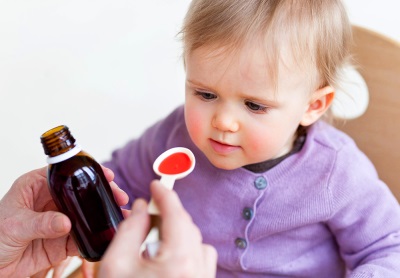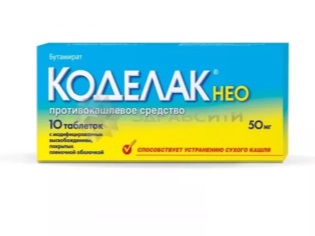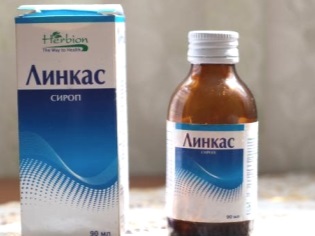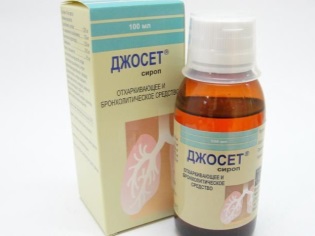Bronholitin for children: instructions for use
Bronholitin is often prescribed for adults with a severe dry cough. But is it possible to use this medicine in children and what features of treatment with Bronholitin is important for parents to know?
Release form
Bronholitin is produced in syrup, which is a viscous liquid that is specifically smelling of basil oil. The color of this syrup is as light yellow and greenish or even light brown. The drug can be transparent and slightly opalescent. It is sold in bottles weighing 125 grams, to which is attached a measuring cup or measuring spoon.
Composition
Bronholitin contains two active ingredients at once. One of them is ephedrine in the form of hydrochloride (5 grams of the drug contains 5 mg), and the second is glaucine in the form of hydrobromide (this substance contains 4 mg per 5 g of syrup). Additionally, basil oil, 96% alcohol, purified water, sucrose and citric acid are added to the medicine. Bronholitin also contains compounds such as polysorbate 80, methyl and propyl parahydroxybenzoate.
Operating principle
The active components of Bronholitin have antitussive effects, and also have a bronchodilator effect. Glaucine affects the cough reflex, but it does not inhibit respiration and does not provoke drug dependence. In ephedrine, the ability to expand the bronchi, eliminate the swelling of the mucous membranes and stimulate respiration is noted. Present as an auxiliary substance, basil oil has an unexpressed sedative effect, as well as antispasmodic and antimicrobial action.
Indications
The reason to appoint Bronholitin is a dry cough for such diseases:
- SARS.
- Whooping cough.
- Acute bronchitis.
- Chronic obstructive pulmonary pathology.
- Tracheobronchitis.
- Bronchial asthma.
- Chronical bronchitis.
- Pneumonia.
- Bronchiectasis.

At what age is it allowed to take?
Instructions for use Bronholitina prohibits the treatment of such a drug for children up to 3 years. However, even over the age of three years, before giving this medicine to a child, you should consult with your doctor to clarify the indications and learn how to take the syrup correctly.
Contraindications
Reception of Bronholitin is not prescribed:
- With thyrotoxicosis.
- With severe pathologies of the heart.
- With elevated blood pressure.
- When pheochromocytoma.
- When hypersensitivity to any ingredient of medication.
- With closed angle glaucoma.
For adults this drug is contraindicated during lactation and in the first trimester of pregnancy. Since the composition of the syrup includes ethyl alcohol, in patients with epilepsy, brain and liver pathologies, Bronholitin is used very carefully.
Side effects
Reception Bronholitina able to cause:
- Tachycardia.
- Sleepy condition.
- Increased blood pressure.
- Vision problems.
- Excitement and insomnia.
- Nausea
- Decreased appetite.
- Difficulty urinating.
- Skin rash.
- Constipation.
- Dizziness.
- Increased sweating.
Instructions for use
The drug is given three times a day after meals, dosing it with a cup or a measuring spoon. For a small patient aged 3-10 years, a single dose of Bronholitin is 5 ml. For children who are 10 years old, it is increased to 10 ml per reception. The average duration of use of the syrup is 5-7 days.
Overdose
To exceed the recommended dose of Bronholitina, the children's body reacts with loss of appetite, severe nausea, dizziness, increased sweating, tremor of the limbs, an attack of vomiting, an agitated state, difficulty urinating. If these signs appear, wash the stomach and prescribe a treatment that helps eliminate negative symptoms.
Interaction with other drugs
- Treatment with Bronholitin does not adversely affect the use of antipyretics, vitamin preparations or antibiotics.
- Due to the presence in the composition of ephedrine, the use of Bronholitin reduces the therapeutic effect of sleeping pills and analgesics-opiates.
- Bronholitin is prescribed along with certain antidepressants or cardiac glycosides, which will increase the risk of heart rhythm disturbances.
- Taking Bronholitin and MAO inhibitors or reserpine can dramatically increase blood pressure.
- If drugs blocking beta-adrenoreceptors are used along with Bronholitin, this will lower the bronchodilator effect.
- You should not combine the reception of Bronholitin and inhalation (for example, with ambroxol or ACC), since the antitussive effect of the drug can cause stagnation of bronchial secretions.
Terms of sale
To buy Bronholitin syrup in a pharmacy, you should have a prescription from your doctor. The average price of one bottle of such medicine is 90-100 rubles.
Storage conditions and shelf life
The bottle of Bronholitin should be kept at a temperature above 0 ° C and below + 25 ° C in a dry place where there is no access for small children. Since release, unopened medicine can be stored for 4 years. When the syrup is opened, the contents of the vial must be used within 30 days.
Reviews
Moms who used Bronholitin in their cough kids, speak of this drug mostly positively. The drug is praised for the rapid effect and low cost. However, there are reviews about the absence of improvements after taking such a syrup. In addition, some children do not like the taste of Bronholitina.
Analogs
If there is a need to replace Bronholitin, you can use drugs with the same composition, for example, Bronchotsin syrup (appointed from 6 years of age) or Bronchoton syrup (prescribed for children 3 years and older). Also, instead of Bronholitina, the doctor may recommend other drugs that are effective in both dry and wet cough:
- Synecod Syrup. Discharged to children over 3 years.
- Codelac Tablets. Appointed to kids who are 2 years old.
- Omnitus syrup. Allowed at the age of 3 years and older.
- Syrup Stodal. Can be applied from 2 years of age.
- Tussin syrup. Assign children older than 2 years.
- Syrup Linkas. Can be used from 6 months.
- Syrup Tussamag. Assign children older than a year.
- Bronchipret syrup. Apply from 3 months of age.
- Joset syrup. May be appointed from birth.
- Ascoril syrup. Recommend to children older than 1 year.
Each of these medications has its limitations in use, so the Bronholitin analogue should be selected only along with a pediatrician.
The following video can be found with detailed instructions to the drug Bronholitin.
